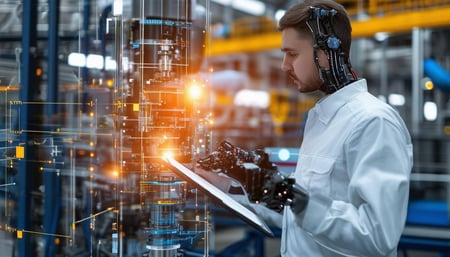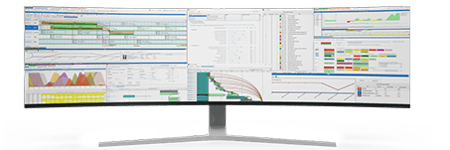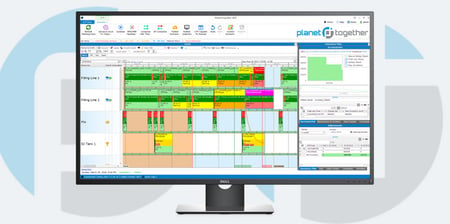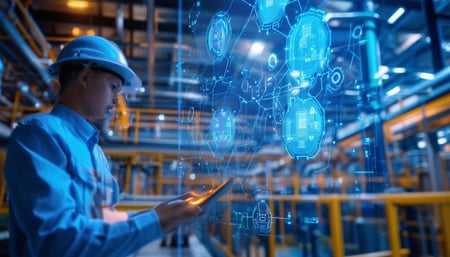AI-Based Decision-Making
Efficiency, accuracy, and adaptability are not just desired traits—they’re essential to remaining competitive in industrial manufacturing. As the pace of manufacturing innovation accelerates, the plant manager’s role grows increasingly complex. From navigating market demands to optimizing resource allocation and maintaining high safety standards, plant managers are tasked with aligning every operational aspect to deliver high-quality, cost-effective products swiftly and reliably.
With the integration of AI-driven tools and platforms, such as PlanetTogether paired with robust ERP systems like SAP, Oracle, Microsoft, Kinaxis, or Aveva, the path to achieving these goals is becoming clearer.
AI-based decision-making systems are particularly impactful in manufacturing environments, where operational data must be transformed into actionable insights quickly and reliably. When implemented with the right integrations, these systems offer an unprecedented level of insight, enabling plant managers to make more informed, proactive decisions that improve efficiency, quality, and responsiveness to market shifts.
This blog explores how AI-driven decision-making, enabled through PlanetTogether and ERP integration, can elevate plant operations to new levels of productivity and competitiveness.

The Need for AI in Decision-Making
In industrial manufacturing, traditional decision-making processes often rely on historical data, reactive problem-solving, and isolated planning tools. While these approaches have worked for years, they struggle to address the real-time, interconnected nature of modern manufacturing demands. Plant managers need more predictive and prescriptive insights that can account for variability, optimize resources, and identify issues before they arise.
AI-based systems offer just that. By leveraging vast amounts of data across production, supply chain, and inventory management, AI can produce recommendations and forecasts that support informed decision-making. The integration of AI into systems like PlanetTogether provides plant managers with the ability to dynamically adjust schedules, optimize labor and equipment usage, and maintain inventory levels that align closely with production needs.
![]()

Understanding PlanetTogether and ERP Integrations
PlanetTogether is a leading Advanced Planning and Scheduling (APS) software that simplifies production planning through powerful algorithms and real-time data processing. However, to fully leverage its capabilities, integrating PlanetTogether with ERP systems like SAP, Oracle, Microsoft Dynamics, Kinaxis, or Aveva is essential. These ERP systems are rich sources of data and critical to plant operations, containing everything from materials and inventory details to financial data and workforce information.
Through integration, AI can pull information from both PlanetTogether and ERP systems, ensuring a holistic view of all plant operations. When this integration is powered by AI, the result is a seamless flow of information, enabling plant managers to access insights that are contextualized, accurate, and actionable.
With PlanetTogether and ERP integration, plant managers can ensure that decisions are not only data-driven but also grounded in the full spectrum of operational data, which is crucial in today’s agile manufacturing environment.

The Benefits of AI-Driven Decision-Making in Manufacturing
AI-driven decision-making in manufacturing brings several transformative benefits, especially when integrated with PlanetTogether and ERP systems:
Enhanced Production Planning and Scheduling
AI algorithms can analyze production requirements, capacity, and constraints to optimize scheduling. This process includes identifying the best sequence of jobs, minimizing machine idle time, and allocating labor efficiently. Integration with ERP systems ensures that the data is accurate, up-to-date, and reflective of real-world constraints, such as inventory shortages or unplanned maintenance.
Predictive Maintenance and Downtime Reduction
Unexpected equipment downtime can significantly disrupt production schedules. AI models can analyze machine data to predict when equipment is likely to fail, allowing plant managers to proactively schedule maintenance. When PlanetTogether is integrated with an ERP, these maintenance schedules can be aligned with production plans, minimizing the impact on operations and ensuring better resource allocation.
Improved Inventory Management and Just-in-Time Production
Inventory management is a delicate balance between meeting production needs and avoiding excess stock. AI models can forecast demand more accurately, guiding inventory levels that align closely with production schedules. Through ERP integration, AI can adjust reorder points and safety stock levels, ensuring that inventory is optimized, reducing waste, and preventing stockouts.
Enhanced Quality Control and Consistency
AI-driven decision-making supports quality control by identifying patterns and anomalies in production data that may indicate potential quality issues. With PlanetTogether and ERP integration, these insights can be implemented immediately, ensuring that production adjustments maintain high-quality standards and reduce variability.
Real-Time Adaptability and Resilience
In a dynamic manufacturing environment, real-time adaptability is crucial. AI-driven tools in PlanetTogether can help plant managers rapidly adjust schedules or resource allocations in response to unexpected changes, such as a rush order or a machine breakdown. Integration with an ERP ensures that any adjustments are feasible within the broader operational constraints, ensuring smooth workflows.

How AI Integration Drives ROI for Plant Managers
Investing in AI-based decision-making through PlanetTogether and ERP integration is not just about operational improvement; it also delivers tangible financial benefits. Key ROI areas include:
Cost Savings: By optimizing production schedules and reducing downtime, AI-driven systems can help lower labor, material, and equipment costs.
Increased Throughput: Efficient scheduling means less idle time for machinery and labor, allowing plants to produce more within the same time frame.
Reduced Waste: Predictive maintenance and optimized inventory management reduce the likelihood of scrapped materials or spoiled inventory, further reducing operational waste.
Higher Customer Satisfaction: With optimized production schedules and improved quality control, manufacturing facilities can better meet customer demand with on-time deliveries and consistent product quality.

Implementing AI-Based Decision-Making in Your Facility
The transition to AI-based decision-making requires thoughtful planning and integration. Here are key steps to consider:
Assess Current Systems and Data Readiness
The foundation of successful AI implementation lies in data. Before integrating PlanetTogether and ERP, evaluate the quality, accuracy, and accessibility of your existing data. Clean, well-organized data is essential for effective AI decision-making.
Define Key Performance Indicators (KPIs)
Establishing KPIs that align with plant objectives helps plant managers measure the impact of AI-driven decision-making. KPIs may include equipment uptime, production cycle time, order fulfillment rates, or overall equipment effectiveness (OEE).
Choose the Right ERP for Seamless Integration
Whether using SAP, Oracle, Microsoft Dynamics, Kinaxis, or Aveva, it’s important to ensure that your ERP system can integrate with PlanetTogether and support the data flow required for AI-based decision-making. ERP choice depends on compatibility with PlanetTogether and your facility’s specific operational needs.
Invest in Training and Change Management
AI-based decision-making requires a shift in mindset for many staff members. Providing training and addressing any resistance to change will help employees adapt to new workflows, ensuring smoother implementation and better results.
Start Small and Scale
Implement AI-driven decision-making in a limited capacity initially, focusing on a particular process or production line. Track improvements, gather feedback, and scale gradually to ensure that the AI implementation is beneficial and sustainable.
Future Trends: The Evolution of AI in Manufacturing
As AI continues to evolve, plant managers can expect even more sophisticated capabilities, such as:
Enhanced Human-Machine Collaboration: AI-driven decision-making tools will increasingly work alongside plant staff, enabling faster and more effective collaboration.
Autonomous Production Lines: Future AI systems will enable production lines to adapt autonomously, adjusting schedules and resources in real time without direct human intervention.
Sustainability Initiatives: AI will play a critical role in meeting sustainability goals by optimizing energy usage, reducing waste, and helping to develop more sustainable production methods.
For plant managers in industrial manufacturing, AI-driven decision-making represents a powerful tool that addresses both current challenges and future needs. With the integration of PlanetTogether and ERP systems like SAP, Oracle, Microsoft Dynamics, Kinaxis, or Aveva, AI-based decision-making becomes not just a goal, but a practical and impactful reality.
By leveraging AI-driven insights for production planning, predictive maintenance, inventory optimization, and quality control, plant managers can ensure that their facilities operate with maximum efficiency and responsiveness. In an industry where adaptability and precision are essential, integrating AI-based decision-making is a strategic move that drives productivity, reduces costs, and positions manufacturing facilities for long-term success.
Are you ready to take your manufacturing operations to the next level? Contact us today to learn more about how PlanetTogether can help you achieve your goals and drive success in your industry.
Topics: Industrial Manufacturing, PlanetTogether Software, Enhanced Production Planning and Scheduling, Improved Inventory Management, Integrating PlanetTogether, Just-in-Time Production, Predictive Maintenance and Downtime Reduction, Real-Time Adaptability and Resilience, Enhanced Quality Control and Consistency




















LEAVE A COMMENT